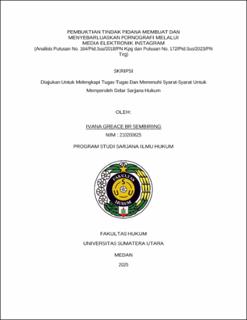| dc.contributor.advisor | Marlina | |
| dc.contributor.advisor | Lubis, Rafiqoh | |
| dc.contributor.author | Sembiring, Ivana Greace Br | |
| dc.date.accessioned | 2025-07-25T08:45:01Z | |
| dc.date.available | 2025-07-25T08:45:01Z | |
| dc.date.issued | 2025 | |
| dc.identifier.uri | https://repositori.usu.ac.id/handle/123456789/107532 | |
| dc.description.abstract | The rapid advancement of information and communication technology has paralleled an increase in increasingly complex crimes facilitated by sophisticated means, posing significant risks and causing public unrest. Pornography is one such crime that has emerged in the realm of morality. The ease of access to various types of content on social media platforms is a primary factor contributing to the widespread dissemination of pornography today. In addressing cases related to the creation and distribution of pornography in court, judges refer to the indictment prepared by the public prosecutor. The indictment serves as the foundation for the judge to examine and render a verdict on the case. The format of the indictment has implications for the evidentiary process and the subsequent judgment. This study examines the legal provisions concerning the criminal act of creating and distributing pornography through electronic media, specifically Instagram; the relationship between the preparation of the indictment and the evidentiary considerations in judicial decisions under Indonesian criminal procedural law; and the considerations of judges in proving such crimes in the verdicts of Case No. 164/Pid.Sus/2018/PN Kpg and Case No. 172/Pid.Sus/2023/PN Trg.
This research employs a normative legal research method, utilizing both statutory and case approaches. The findings indicate that the criminal act of creating and distributing pornography is regulated under Law No. 44 of 2008 concerning Pornography. However, when such acts are committed through electronic media, they are governed by Article 45, paragraph (1) in conjunction with Article 27, paragraph (1) of Law No. 19 of 2016. This dual legal framework necessitates that public prosecutors exercise caution when prosecuting individuals for creating and distributing pornography electronically, as two separate laws are applicable. The indictment functions as a guide for judges in conducting examinations, assessments, and delivering judgments. The format of the indictment influences the judge's considerations in rendering a decision. In Case No. 164/Pid.Sus/2018/PN Kpg, the indictment prepared by the public prosecutor was flawed, affecting the evidentiary process and the judge's verdict. In contrast, in Case No. 172/Pid.Sus/2023/PN Trg, the indictment was structured alternatively, allowing the judge to select the charge deemed proven. | en_US |
| dc.language.iso | id | en_US |
| dc.publisher | Universitas Sumatera Utara | en_US |
| dc.subject | Proof | en_US |
| dc.subject | Pornography | en_US |
| dc.subject | Electronic Media | en_US |
| dc.title | Pembuktian Tindak Pidana Membuat dan Menyebarluaskan Pornografi Melalui Media Elektronik Instagram (Analisis Putusan No. 164/Pid.Sus/2018/PN Kpg dan Putusan No. 172/Pid.Sus/2023/PN Trg) | en_US |
| dc.title.alternative | Proof in Criminal Acts of Producing and Disseminating Pornography via Instagram as Electronic Media (Analysis of Decision No. 164/Pid.Sus/2018/PN Kpg and Decision No. 172/Pid.Sus/2023/PN Trg) | en_US |
| dc.type | Thesis | en_US |
| dc.identifier.nim | NIM210200625 | |
| dc.identifier.nidn | NIDN0007037501 | |
| dc.identifier.nidn | NIDN0025077403 | |
| dc.identifier.kodeprodi | KODEPRODI74201#Ilmu Hukum | |
| dc.description.pages | 139 Pages | en_US |
| dc.description.type | Skripsi Sarjana | en_US |
| dc.subject.sdgs | SDGs 16. Peace, Justice And Strong Institutions | en_US |


